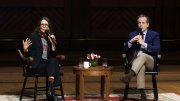Planning for a season of live performances, American Repertory Theater (A.R.T.) has taken on the Anthropocene. WILD: A Musical Becoming (December 5 to January 2) is a fable centered on a struggling single mom offered a deal to lease land on her family farm to energy extractors. She and her teenage daughter face off over the decision in a wrenching attempt to grapple with the earth’s sixth extinction. “We’re encountering the devastating effects of climate crisis in our world on a daily basis. It can be terrifying and numbing,” says A.R.T. artistic director Diane Paulus, who also directs the show. “WILD: A Musical Becoming offers anotherway to grapple with this reality, through music and narrative.”
The musical, written by V (formerly Eve Ensler), stars Idina Menzel, with music by pop songsters Justin Tranter and Caroline Pennell. Young people, like those in the Boston Children’s Chorus (which A.R.T. is hoping can participate) play vital roles in a production built around the spirited passion of environmental advocates (like Greta Thunberg) because, Paulus says, they “are leading the charge for change.” Absent are costly production tangibles, like props and sets, as Paulus embraces a new form of theater “that is really mindful of regenerative practice and focuses on words, music, humans on stage, storytelling, and our imagination.” Quality pop music—Tranter has written songs for Lady Gaga, Demi Lovato, Selena Gomez, and Ariana Grande, among others—also taps into the cultural zeitgeist, with a focus on personal activism. Look for fantastical elements, shapeshifters, and other opportunities that art and culture, especially live theater, engender. “Theater gives us the space to engage in a different way than the news—to engage with our hearts and minds and imaginations, because more than anything,” says Paulus, “we have to be alive inside this crisis so we can find a way to act, and to not give up.”









